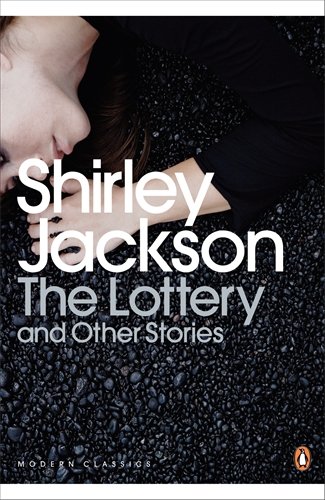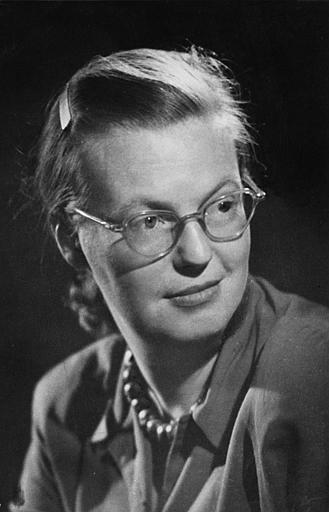
('Here you are!' © Rafal Biernat, 2013)
*
OPENING THE BLACK BOX
by RACHEL STEVENSON
~
Shirley Jackson’s ‘The Lottery’, first published in 1948 in The New Yorker, is rich in meaning, imbued, like so many of her stories, with symbolism and metaphor. But it takes careful reading of the figurative language to extract an explanation of, and from, the text.
‘The Lottery’ was written in the first half of the twentieth century and is rooted in its own time and place. The story could be said to be in the modernist tradition. William Boyd states in his essay for the Guardian ‘Brief Encounters’ that, in a modernist story, ‘the inaccessibility of the subtext […] makes the story so memorable’. In ‘The Lottery’, symbolism plays a larger role. Symbolism can be characterised as attributing symbolic meanings or significance to objects. Jackson never states explicitly that the village lottery exists to create a ‘sacrificial lamb’ to ensure that the harvest will be a good one. The reader does not gain access to anyone’s thoughts and none of the characters explain what is happening. The reader is an observer, and must work out what is taking place through language and symbols.
 The central symbol is the black box, which has more than one meaning. It is black – a common symbol of death – but it also links the villagers with their traditions. The building of a new box is discussed, because the old one is shabby, but never carried out; this is a community that couldn’t alter its traditions. One could also say that the box is an icon:
The central symbol is the black box, which has more than one meaning. It is black – a common symbol of death – but it also links the villagers with their traditions. The building of a new box is discussed, because the old one is shabby, but never carried out; this is a community that couldn’t alter its traditions. One could also say that the box is an icon:
There was a story that said the present box had been made with some pieces of the preceding box, the one that had been constructed when the first people settled down to make a village here.
It is similar to a religious relic. The black spot, which the unlucky loser of the lottery picks, again alludes to death, and the similar device in R. L. Stevenson’s ‘Treasure Island’.
The box, representing both tradition and death, makes Jackson’s point clearly – to carry on with tradition and ritual equals death. This can be taken both literally, in the case of Tessie Hutchinson, the ‘winner’ of the Lottery, and figuratively, in the sense that if societies don’t move on, they will be wiped out by progress. The box represents the institution of the Lottery and the Lottery represents the village: they have an annual rite that is part of their being, an integral part of their sect, and the village could be said to represent society at large. Jackson is making the point that there is evil lurking in everybody’s heart. The story was published three years after the end of World War Two and it could be seen as an allegory of the holocaust: society needs a scapegoat, a person or a group to victimise.
Names of the characters are also rich in meaning. Tessie’s friend is Mrs Delacroix: French for ‘of the cross’, making the reader think of Biblical punishments and sacrifice. Old Man Warner is literally a warning: both warning the villagers that they should not give up the Lottery – “Nothing but trouble in that” – and a warning to the reader of remaining the same, not changing. The tyranny of tradition creates a refusal to change or adapt. Warner is a winner in life’s lottery and the ritual’s most ardent supporter: he has survived seventy-seven of them. Opposite Old Man Warner are the children, who could be a hope for the future – it is only the young people who show some emotion about the result of the lottery: ‘A girl whispered: “I hope it’s not Nancy”’.
Mr Summers – the story takes place on 27th June, just after the summer solstice with its resonance of pagan festivities and perhaps pagan sacrifice – has his opposite in Mr Graves, his helper, again linking the lottery to the grave and death. According to the critic Fritz Oehlschlaeger, in his 1988 essay ‘The Stoning of Mistress Hutchinson: Meaning and Context in The Lottery’, Jackson used the name Hutchinson to connect the character of Tessie to Anne Hutchinson, another rebellious New England woman, whose religious beliefs led her to be expelled from Massachusetts in 1638.
 As well as names, Jackson uses specific language and actions to more strongly get her point across. We are told early on in the story that the villagers feel sorry for Mr Summers, whose wife is a ‘scold’ – a word that conjures up archaic forms of punishment such as the ducking stool and the scold’s bridle. The way of killing the victim, stoning, is a Biblical punishment, and the idea of sacrificing an innocent to help the harvest, is pagan, pre-historic. Jackson is robustly suggesting these are both ancient horrors that shouldn’t exist in 1948 society.
As well as names, Jackson uses specific language and actions to more strongly get her point across. We are told early on in the story that the villagers feel sorry for Mr Summers, whose wife is a ‘scold’ – a word that conjures up archaic forms of punishment such as the ducking stool and the scold’s bridle. The way of killing the victim, stoning, is a Biblical punishment, and the idea of sacrificing an innocent to help the harvest, is pagan, pre-historic. Jackson is robustly suggesting these are both ancient horrors that shouldn’t exist in 1948 society.
In the story, moral authority is based on unquestioned traditions, and unchanging, traditional practice is very powerful. Mr Summers, as the facilitator of the Lottery (and the person who runs the town’s major industry, the coal mine) has the power, whereas Tessie, the victim, and, as a woman, a second-class citizen, unable even to draw the lot for her family, is powerless. We know that Tessie would not rebel if another person had picked the black spot (she is uncomplaining before her family is chosen), but it is the power of the majority that results in her death.
Without simile, metaphor, allusions, or symbolism within the text, this story would be a mere macabre tale. But, instead, it is highly compelling. By making use of figurative language, Jackson almost asks the reader to examine her story more closely. Which, ultimately, leads to a more fulfilling understanding of her work and her intentions.
~
 Rachel Stevenson grew up in Doncaster, South Yorkshire, and now lives in London, UK. She has contributed to Smoke: A London Peculiar, Here Comes Everyone, Short Story Sunday, Firewords, A Cuppa and an Armchair book (Createspace Publishing, 2011), The Guardian, Are You Sitting Comfortably podcast, and her work has been made into a short film for the Tate website, narrated by Christopher Eccleston. She was shortlisted for the Commonwealth Writers’ Prize 2015.
Rachel Stevenson grew up in Doncaster, South Yorkshire, and now lives in London, UK. She has contributed to Smoke: A London Peculiar, Here Comes Everyone, Short Story Sunday, Firewords, A Cuppa and an Armchair book (Createspace Publishing, 2011), The Guardian, Are You Sitting Comfortably podcast, and her work has been made into a short film for the Tate website, narrated by Christopher Eccleston. She was shortlisted for the Commonwealth Writers’ Prize 2015.


One thought on “Opening the Black Box”
Comments are closed.